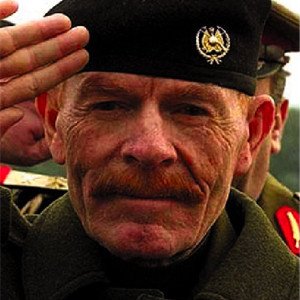Izzat Ibrahim al-Duri. Revolutionary Command Council (RCC) Vice-Chairman / Northern Region Commander / Inner Circle/ Deputy Secretary General, Ba’th Party Regional Command / Deputy Commander, Armed Forces. #6 of Iraq's 55 Most Wanted http://www.defendamerica.mil/iraq/iraqi55/i55-3-13.html
BAGHDAD, Nov. 4 (UPI) -- One of the most ruthless and influential insurgent groups in Iraq is the Baathist movement, die-hard remnants of Saddam Hussein's Sunni-dominated regime who are led by Saddam's longtime Vice President Izzat Ibrahim al-Douri.
He's the last of the plotters who put the Baath Party in power in Baghdad in a 1968 coup. Now a frail 68, al-Douri, based in Saddam's one-time stronghold of central Iraq, has evaded capture for more than seven years.
The Americans say he's active in financing and organizing the Sunni insurgents known as Jaish Rejal al-Tariqah al-Naqshbandia, which security expert Michael Knights says is "rapidly becoming the most influential insurgent group in the country."
JRTN styles itself as a Sunni fundamentalist organization, establishing its Islamist credentials while seeking to reinvent itself as a nationalist movement comprised of experienced administrators and technocrats determined to provide firm and progressive government.
Al-Douri, whose daughter was married to Saddam's eldest son Udai, was the former head of the Baathist Revolutionary Command Council, the key decision-making body in Saddam's regime.
The red-haired al-Douri is widely known in Iraq as "the iceman" because as a young man he sold blocks of ice from a donkey cart in his hometown, Dour, north of Baghdad, before he became Saddam's right-hand man.
He's the only member of Saddam's inner circle still at large. The elusive al-Douri claimed leadership of the banned party after Saddam was executed Dec. 20, 2006, and he's now the longest-surviving insurgent leader in Iraq.
Saddam's foreign minister, the urbane Tariq Aziz, was sentenced the death by Iraq's Supreme Court in October. If that sentence is carried out, al-Douri will be the last man standing from Saddam's inner circle.
That will enhance al-Douri's status among Baathists and the wider Sunni minority, which has been largely marginalized since Saddam was toppled in April 2003.
The secular Baath was forced underground then but it retains considerable influence among the Sunnis who were the pillar of Saddam's regime.
Indeed, al-Douri's organization has become so pervasive and influential that Knights says he believes it will become increasingly important as a political factor as the U.S. military withdrawal moves toward its scheduled conclusion in late 2011.
Knights reported in the Gulf States Newsletter that al-Douri's organization has gained strength as the Sunnis find themselves adrift after backing former Prime Minister Iyad Allawi, a secular Shiite, in the inconclusive March 7 parliamentary elections.
Although Allawi's Iraqiya alliance of Shiites and Sunnis won the highest number of seats -- 91 -- in the 325-member parliament, it failed to secure a governing coalition.
All the indications are that incumbent Prime Minister Nouri al-Maliki, backed by Tehran, will lead the next government with a Shiite coalition.
Security officials note that the Sunni insurgents are probably responsible for most of the current surge in violence that has been widely attributed to al-Qaida and its alter ego, the Islamic State of Iraq.
The officials say thousands of former Sunni insurgents lured by the Americans into defecting to the Baghdad regime and now disillusioned by the Maliki government's refusal to absorb them into the military, are being recruited by JRTN.
Knights observed that with the Baathist creed gaining strength as U.S. troops depart, leaving deep political uncertainty rather than democracy in their wake, al-Douri's JRTN is well positioned to make a mark.
"If anyone can bring off even part of the purported JRTN agenda, it is Izzat Ibrahim al-Douri," he wrote. "He has found a knack for keeping himself alive and relevant in Iraq's insurgent politics.
"He boasts a bevy of special relationships with groups as diverse as Iraq's Sufis, Ansar al Islam (an extremist Islamist group), the tribes of north-central Iraq and nationalist militant movements such as Jaish al-Mujahedeen," Knights observed.
"Having stayed in Iraq permanently since 2003, al-Douri is the last link to the Baath government and his insurgent credentials are rock solid compared to all the young pretenders in Iraq and the exiled Baathists outside."
According to diplomatic sources, the U.S. intelligence establishment, dismayed at the prospect of a Tehran-guided regime emerging in Baghdad, is discussing the potential role that former Baathists might play in Iraq politics.
In December 2009, intelligence sources reported U.S. emissaries met al-Douri and other Baathist military and intelligence officers to establish connections with them. But what emerged remains unclear.





